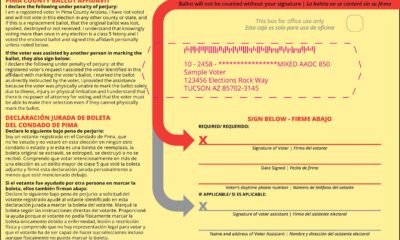arizona
America Takes a Stand: Safeguarding Democracy Against Election Intimidation

ROCHESTER HILLS, Mich. – The aftermath of the 2020 presidential election left many public servants in the crosshairs of hostility, notably Tina Barton, the city clerk of Rochester Hills. A week after the election, she found herself listening to a threatening voicemail: a man’s voice declaring, “We will f***ing take you out.” This chilling message, filled with similar language used by then-President Donald Trump, stemmed from her role in an election that had become fiercely contentious.
Barton described the week leading up to that moment as a “week from hell,” having worked tirelessly to administer the election amid increasing tensions. After saving the threatening message, she took steps to protect her family, even enlisting military friends to assess vulnerabilities in her home. Cameras and floodlights became fixtures at her residence, and paranoia seeped into her daily life.
“Living in a state of hypervigilance became my new normal,” she said. “Anytime someone feels threatened in a way that impacts their well-being, it constitutes violence.” Barton has since shifted her focus to training others who might face similar threats in their roles as election officials.
Since the election, the environment for election workers has dramatically shifted. Once a largely unseen profession, clerks and administrators have become targets of public outrage and misinformation, manifesting in threats and intimidation. Reports indicate that an administrator in Georgia received a death threat marked with crosshairs, while an Arizona official dined with armed guards during Thanksgiving due to security concerns.
Arizona, in particular, has seen an uptick in threats, particularly against election officials. Following the gubernatorial candidacy of Kari Lake, a significant number of cases prosecuted by the U.S. Department of Justice were tied to threats in that state. These incidents expose a troubling trend of violence directed at those orchestrating the electoral process, highlighting challenges to maintaining the integrity of American democracy.
According to a Brennan Center for Justice study, 54% of election workers report fearing for their safety, with 34% knowing someone who has quit due to such concerns. Those remaining grapple with uncertainty about the future of their roles amid a volatile political climate.
As election offices brace for the upcoming presidential cycle, many are enhancing security measures. In Shasta County, California, officials have constructed security fences, and in Ohio, panic buttons are being installed at election offices. Across the nation, law enforcement is now prioritizing election safety, recognizing the need for preparedness against potential violence.
Some states have taken legislative action, with more than 60 bills introduced in 40 states aimed at increasing protections for election officials or toughening penalties for intimidation. However, some regions have enacted laws that complicate the voting process amid claims of election interference.
In Georgia, Chris Harvey, who oversaw elections until recently, faced blatant threats following the 2020 elections. As he transitioned to a position focused on law enforcement training, he emphasized the importance of educating officers about election laws to ensure informed responses to emergencies at polling locations. Harvey’s efforts have culminated in mandatory training for law enforcement statewide.
The horrors of threats against election officials aren’t confined to any single state. In Arizona, threats escalated during the aftermath of the 2022 gubernatorial race, reflecting a broader climate of hostility. Maricopa County Supervisor Bill Gates encountered threats shortly after the primary elections, including messages urging violence against officials.
Tom Liddy, head of the civil division at the Maricopa County Attorney’s Office, has received dozens of threats, leading to increased law enforcement presence around his family. After receiving alarming communications, he was placed under the protection of armed FBI agents as investigations commenced. Recognizing the gravity of threats against public officials, lawmakers are advocating for more rigorous safeguards.
As Tina Barton confronted her harasser in court, she articulated the lasting impact of such threats, revealing her struggle with post-traumatic stress disorder. Her assailant received a 14-month sentence, a reminder of the ongoing challenges that election officials face. “You haven’t gotten the best of me,” Barton declared, asserting her resolve against the intimidation she endured.
The testimonies and actions taken in light of these threats signal a pressing need for reform and protection for those safeguarding democracy. As election officials work to ensure safe electoral processes, the path ahead remains fraught with uncertainty and potential danger.


















